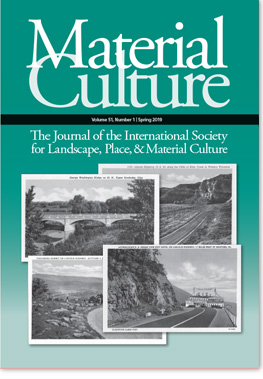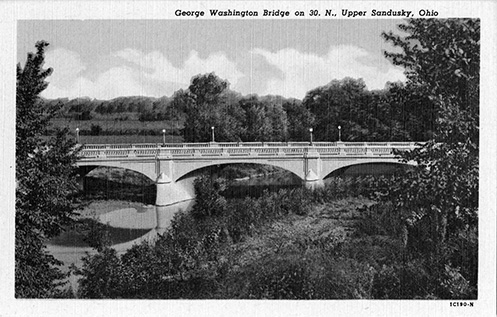Material Culture is printed two times a year for members of PAS:APAL. It is abstracted and indexed in: JSTOR, ProQuest, History and Life, Historical Abstracts, GeoAbstracts, and the MLA International Bibliography. You may download a PDF of the table of contents of the current issue here. Spring 2019 Material Culture includes:
 Postcard Imagery and Geographical Imagination along the Lincoln Highway
Postcard Imagery and Geographical Imagination along the Lincoln Highway
Douglas Hurt, University of Missouri and Adam Payne, Auburn University
Abstract: Linking New York City with San Francisco, the Lincoln Highway was one of the first improved transcontinental highways in the United States. Although it is a historically significant transportation corridor, the road has not maintained a prominent place in American popular culture. As part of the process of understanding early place promotion and the contribution of the Lincoln Highway to the American collective imagination, we assessed 237 postcards made by the Curt Teich Publishing Company that focused on the roadway. Four postcard themes — business promotion, evolving automobility and roadways, distinctive rural landscapes, as well as common urban landscapes — emerged and illustrate how images of the Lincoln Highway were portrayed to the public, primarily before 1960. These imaginative, visual geographies contributed to the shaping of regional perceptions as Americans began to engage in automobile-based tourism in the early-to-mid twentieth century.

Horses and Stables in the Farms of Île-de-France (France) During the Seventeenth to Mid-Twentieth Centuries
By Jean-Yves Dufour, Institut National de Recherches Archéologiques Préventives (France)
Abstract: The contents of old agricultural treaties, field observations carried out prior to the demolition of old farms in Île-de-France (France), and archaeological excavations provide us with essential information concerning the importance of animal shelter for the farms of an important cereal area, the Île-de-France. Field observations and distribution models for animals within the farm demonstrate that a privileged relationship existed between men
and horses.Material Culture Research: Field Observations on Linking Brands and Nationalism
Joseph L. Scarpaci, Center for the Study of Cuban Culture + Economy, Blacksburg, VA
Our research essay opens with a quote instead of an abstract: “Material culture is singular as a mode of cultural investigation in its use of objects as primary data, but in its scholarly purposes it can be considered a branch of cultural history or cultural anthropology. It is a means rather than an end, a discipline rather than a field” (Prown 1982).
